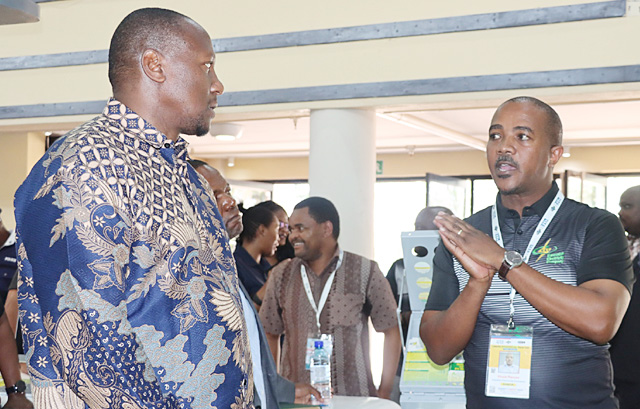By Nokunceda Magagula | 2025-03-26

The importation of non-woven bags by some local retailers is significantly impacting the operations of local manufacturers, particularly those producing sustainable alternatives to traditional plastic bags.
non-woven bags, made by bonding fibres together without weaving or knitting, have gained popularity since the ban on plastic bags in the country. Director of Greenland Eco Bags Ezekiel Malenya, a local manufacture of non-woven bags, expressed his concerns about the situation.
He explained that when his company started manufacturing the bags, the response was good as it was just after the ban of plastic use in the country. He said people were looking for solutions for where they could get such bags. “However, we soon realised that some retail shops were importing non-woven bags, which affected our production, "he said.
Malenya explained that due to low orders from retailers opting for imported bags, his company had to reduce production shifts from two to one, impacting employment
"The creation of employment that we had made to be around 100 had to be reduced," he said.
He highlighted the importance of supporting local businesses.
The director said the king, in his speech from the throne had emphasised that supporting local industries created jobs and stimulated the economy.
"By supporting local, you are basically hitting two birds with one stone. You are growing the local economy, and with more production, we can even begin to export outside the country," he said.Malenya wondered why retailers would choose to import non-woven bags, stating that imported products were often more expensive due to tax charges at the border.
"However, he alleged that some retailers sneaked through the border without declaring their products, which makes the bags cheaper and allows them to gain more profit. "While large profits are what a business person wants, for the country’s economy to grow, that should not be happening." He decried the lack of protective policies for local manufacturers as a significant hurdle."
The director said as manufactures grapple with these challenges, the call for stronger support for local businesses and clearer regulations around the plastic ban was essential.
“If those policies were put in place, we would not face such problems or challenges," he said, adding that the Citizens Economic Empowerment Act of 2024 could serve as a valuable tool to address these issues.
The act aims to drive inclusive economic growth by empowering local businesses, especially micro small medium enterprises (MSMEs), through measures like preferential procurement. Another concern raised by Malenya was the ambiguity surrounding the ban on plastics, which he believes has led to confusion among consumers and retailers alike.
Meanwhile, Eswatini Environment Authority (EEA), Head of Environmental Impact Assessment, Monitoring and Coordination Belusile Mhlanga indicated that the issue surrounding the plastic ban was discussed at cabinet.
"After the initial ban, there was a petition from plastic manufacturers, and we are awaiting cabinet to deliberate about the issue," Mhlanga stated.
share story
Post Your Comments Below

SOMHLOLO National Stadium is set to take centre stage once again, with the Confederation of Afric...

SEVERAL government ministries experienced a three-day power outage after the Eswatini Electricity...
MINISTER of Finance Neal Rijkenberg has addressed claims suggesting that he remains a sha...

Events of the past few weeks will forever be etched in our history books as the period during whi...
All material © Swazi Observer. Material may not be published or reproduced in any form without prior written permission.
Design by Real Image Internet